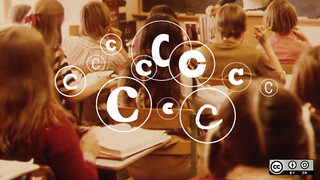Since the campus library’s instruction program is robust, and scaffolded, students should be arriving in Environmental Geography (a 200 level class) with a predictable set of research skills based on the library instruction and guidance that they have received in classes previous to this one. In addition, there were certain skills that I was confident that students would not have according to the outcomes that the library has developed for the 300 level class (BIS 300, for students in the school of Interdisciplinary Arts and Sciences) that we provide instruction for.
Based on the assignment that the instructor sent me, my understanding of our instruction program, and my previous instruction experience, I bounced into class on Halloween, with streaks of vampire makeup on my face, to teach a very brief introduction to the class guide that I’d made them and a few tips I thought they’d find useful. The instructor gave me a very generous introduction, and I launched in to my spiel to be rewarded with glassy eyes, and bored stares. Unfortunately, the students seemed to find my Halloween costume far more interesting than the material I had to present.
After finishing up, I went to talk to Jackie Belanger and Leslie Bussert, about what had happened. True to their positions (as Assessment Coordinator and Head of Instruction, respectively), they suggested that I conduct a little low-stakes assessment to see if I could figure out why my session had flopped. As part of this assessment, they suggested that I sit in on the students’ presentations at the end of the quarter to gather information about what sources they ended up using and how the projects shaped up.
In collaboration with Jackie and the instructor, I knocked together a 1 page survey that asked, among other things:
- What did you learn in the library session that helped you with your research for this class?
- What did you find most challenging about your research for this class?
- If you have received instruction in library research methods for other classes at UWB or Cascadia, was the information that you received in this class the same or different from the information that you have received in other classes?
What I found was that over half the class had taken the 300 level class in which they get about 6 hours of in-depth library instruction. Therefore, the things that they found most useful from my session were not the research tips (that they’d gotten plenty of practice with in BIS 300), but the brief exposure that I’d given them to subject-specific resources for their assignment. After talking to several librarians who teach in the BIS 300 classes, the consensus seemed to be that students had a lot of practice with humanities and social science resources, but needed exposure to the natural sciences resources that would be most useful for their Environmental Geography assignment.
After a student worker transcribed all of the responses into a excel spreadsheet, I sent them, and my observations, to the instructor with a request that we chat before I did the same session the following quarter. When we got together, we talked over the results, the analytics for the class guide that I’d made, strategies for what to change, and a plan to continue the assessment process the following quarter.
The session went far better the second time around. Students were more engaged, took extensive notes, and were visibly and audibly appreciative of the material that I’d presented. When I sat in on their presentations at the end of the quarter and conducted the second round of assessment, the results confirmed my experience: the revisions that I’d made based on student feedback had increased the relevance of my session.
There were some other unintended but very welcome consequences of this process. The investment in student learning that I’d demonstrated through the assessment process proved to the instructor my commitment to his classes, subject, and students. As a result, we have a very open and communicative working relationship that’s been a boon to my other duties as liaison to him and his colleagues. I got really useful insight into the subject matter of my liaison area, and it has helped me to learn the ropes of what was a previously unexplored discipline for me. The process also brought me closer to the students that I worked with, and I got lots of reference questions on the assignment during the quarter, and afterward, from students who I’d met in the class.
While it was intimidating for me to conduct assessment on an session that I knew hadn’t gone well, I am convinced that hearing the truth and being able to act upon it was far better for me than living with a vague sense of failure, and several more unsuccessful sessions. The insight and relationship building that I gained through this assessment experience was an invaluable part of my first year as Geography/GIS liaison at the Campus Library and was instrumental in my process of learning the job, meeting my colleagues, and getting to know the students.
You'll find a copy of the survey that I used after the jump.






